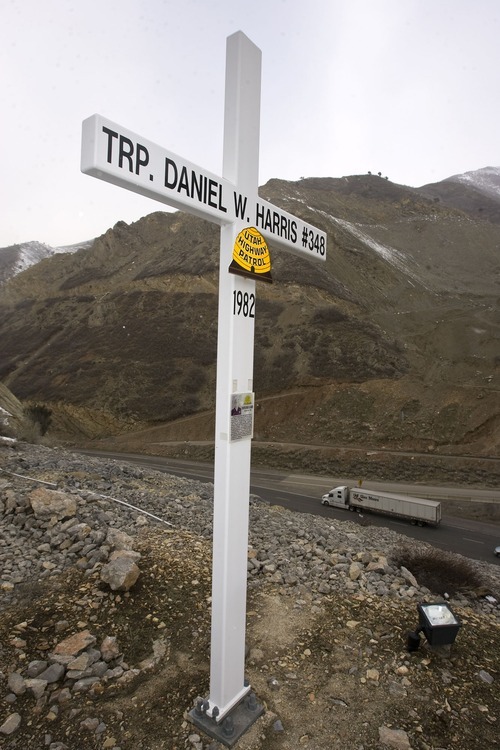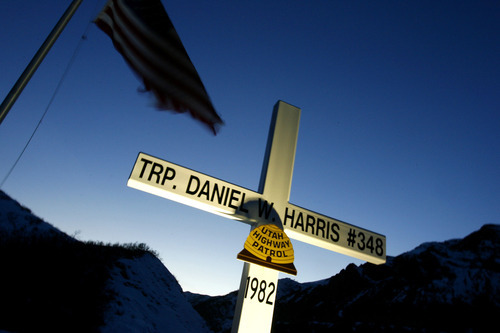This is an archived article that was published on sltrib.com in 2011, and information in the article may be outdated. It is provided only for personal research purposes and may not be reprinted.
A Utah legislator will partner with a conservative group on Thursday to protest U.S. Supreme Court justices' decision not to hear a contentious First Amendment case over the appropriateness of placing 12-foot-high crosses on public property in Utah to memorialize state troopers killed in the line of duty.
Supreme Court justices decided Monday not to hear the case after discussing its merits in four separate conferences.
That means the 10 of the 14 white crosses that currently sit on public land, either outside UHP offices or alongside a highway, must either come down or be moved to private property. All 14 of the 12-foot high, crosses, whether on public or private lands, must have the UHP insignia removed.
The Utah Highway Patrol Association does not have a timeline for removing the crosses and will weigh its options before deciding how to proceed.
Carl Wimmer, a Republican from Herriman who is running for Utah's 4th Congressional District, will "express deep disappointment" during a stop in Murray Thursday beside one of the highway crosses that is scheduled to come down. Appearing with Wimmer will be Tom McClusky, vice president for the Family Research Council Action, a Washington-based organization that promotes faith in public policy.
"The U.S. Supreme Court let stand a 10th Circuit Court of Appeals decision to remove the 14 crosses bearing the names of fallen Utah state troopers that have been placed at roadside locations. In addition to Utah, the cross removal order will affect five other states including Kansas, Colorado, Oklahoma, New Mexico and Wyoming," the Family Research Council stated in a news release.
"The Supreme Court's refusal to hear the case could have significant implications for national memorials and monuments across the nation, including, but not limited to, the crosses on headstones in Arlington Cemetery."
Wimmer's announcement of disappointment mirrors a similar statement by Utah Attorney General Mark Shurtleff, who pushed the high court to take on the case, arguing that the highway crosses should be displayed.
"With two simple lines the highway crosses remind us of the ultimate sacrifice made by troopers while trying to protect us," Shurtleff has said. "Before now, no other court has ever held that memorial crosses establish a religion. The crosses only establish a trooper died in the line of duty."
Brian Barnard, a Salt Lake City civil rights attorney who represents the organization against placing crosses on public land, was pleased with the high court's decision. Barnard, who filed a brief on behalf of American Atheists Inc., argued the case was not worthy of the high court's attention.
Filings earlier this year by Barnard and Shurtleff were the latest arguments in what has been a lengthy court battle over the alleged display of religious imagery on public land between the UHPA and American Atheists Inc.
In January, a federal appeals court in Denver delayed an order demanding the UHP remove crosses placed along the state's highways to commemorate troopers killed in the line of duty. The 90-day stay, approved recently by the 10th Circuit Court of Appeals, allowed attorneys for the association and UHP to try to appeal their case to the nation's highest court.
Former Texas Solicitor General Ted Cruz represented the A.G.'s Office and attorney Byron Babione of the Alliance Defense Fund in Arizona tried to persuade the Supreme Court to take the case. They argued that the crosses don't establish a religion because "the passive memorials coerce no one to do anything."
The 10th Circuit, in its opinion last year, disagreed, calling the cross Christianity's "preeminent" symbol."
The case began when American Atheists and three of its Utah members sued the state in 2005 for allowing the association to incorporate the UHP logo on the 12-foot-high crosses and place some of them on public property.
Fourteen crosses sit alongside state highways or on the lawn outside a UHP office.
The trooper's name, rank and badge number are printed on a 6-foot crossbar, and a large depiction of the UHP's beehive symbol hangs below where the two bars meet. The first cross was erected in 1998 on private property and 13 others were added later, most of them on public property. The memorials are privately funded and owned by the UHPA, while the state owns the public land on which some of them sit.
The 10th Circuit Court of Appeals ruling in January to allow the stay followed a 5-4 December decision by the same court to deny a request to hear the case from the UHPA.
The UHPA had wanted the court to reverse an earlier ruling that the crosses are unconstitutional.
Support was needed from nine justices to have the case heard by the U.S. Supreme Court. Only Justice Clarence Thomas supported hearing the appeal, a position he detailed in a 19-page dissent.
Thomas saw the case as an "opportunity to provide clarity to an Establishment Clause jurisprudence in shambles," citing diverging case law concerning the constitutional language that protects against government establishing or endorsing a religion.
In his dissent, Thomas criticized the 10th Circuit's opinion that an observer might see the crosses and believe the "Utah Highway Patrol and Christianity had 'some connection,' leading him to 'fear that Christians are likely to receive preferential treatment from the [patrol].' "
Shurtleff called the high court's decision not to hear the case a missed opportunity to tackle Establishment Clause issues.
"Ultimately, the Supreme Court is going to have to have a nationwide ruling on this and this was a chance to do that," Shurtleff said. "We continue with the irony that the Supreme Court meets every day under Moses and the Ten Commandments [which are depicted in stone on the outside of the U.S. Supreme Court building]. They've made it very clear you can have religious symbols in the public sector. But that's now left to each city and county and state. It's going to lead to more litigation."
American Atheists President David Silverman, meanwhile, said "the American public has been spared a drama" with the court's decision.
Both Barnard and Silverman expressed hope that the UHPA would find more "suitable alternatives" for the fallen officers' memorials.
"We hope and expect the [UHPA] to not just take down the crosses but actually replace them with suitable memorials," Silverman said. "We want the fallen troopers to be honored. ... These people died serving their country and they should be honored in a way that upholds the Constitution they died protecting."
"Troopers can be and should be honored with a symbol that is inclusive of all Utahns," Barnard said in a news release. "A state-approved memorial should represent those who are not religious as well as those who are. The memorials should not emphasize one religious faith to the exclusion of all others. A memorial symbol endorsed by the state should not be religious but should be universal."
Twitter: @mrogers_trib
Tribune reporter Aaron Falk contributed to this report. —
Conservative group plans protest next to roadside cross
Carl Wimmer, a Republican candidate for the U.S. House of Representatives, will appear on Thursday with the vice president for the Family Research Council Action, a Washington-based organization that promotes faith in public policy.
The two will protest the U.S. Supreme Court's decision not to hear a contentious case involving roadside crosses in Utah.
The event will take place 11 a.m. at the Section 4 Highway Patrol Office, 5681 S. 320 West, in Murray.





